Monthly Archives: June 2019
End of June 1919
Fun on the River and the Return of Nurse Valentine
All material produced or reproduced here and throughout this work is the sole copyright of the author and the family of Doctor D.C.M. Page MC
“During the summer some of us frequently hired a row-boat of an afternoon, and went for a sail up one of the tributaries of the Dwina. We got away from the smell of dirty Solombola to where the river twisted and turned between green fields, and wooded banks. Often we rowed across the Dwina to a small island opposite our Hospital. Here there was a lovely stretch of sand, and we had many a glorious bathe over there. One evening we had a pic-nic over there with the Hospital Sisters, and on another occasion I was present at a large pic-nic there got up by Sister Valentine, a British Nurse who lived in Russia in pre-war days, and spoke the language like a native.”
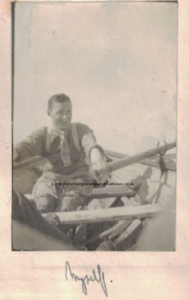
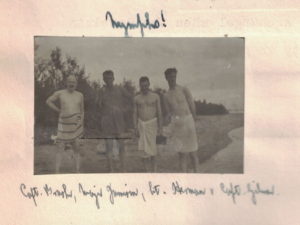
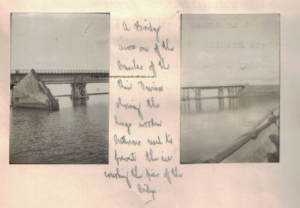
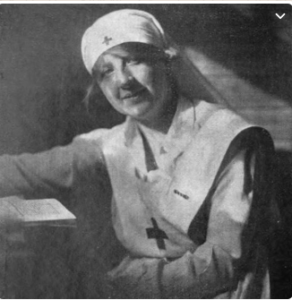
Selma Amy Valentine as a Voluntary Aid Detachment nurse.
Nurse Valentine spoke Russian “like a native”. This may not have been such a surprise to Douglas had he realised that Nurse Valentine was actually born in Russia.
Selma Amy Valentine was born in probably St. Petersburg on July 17 1893 making her just over a year older than Douglas Page. Her father was an Ulsterman of French extraction and her mother was from high stock, being the daughter of the Governor of the Baltic States.
The story of Selma Valentine is one of an incredible woman little known these days but is worthy of more study. She spoke Russian, English, German and French. During her lifetime she would live in London, Paris and Johannesburg and met many people of note including Queen Alexandra and her son King George V, Hilter, Mussolini and many others. Suspected of being a Bolshevist, she was arrested by the British in Shenkursk where she was looking after her parents who had lost everything to the reds. Then she joined the Royal Navy as a Wren. She was also a VAD nurse, returning to teach in Shenkursk. She would leave Russia when the British evacuated later in 1919. She was active in India, and South Africa where she died on 6th November 1968.
Find out about our connection with Dr Page and an introduction to his diary here
25th June 1919 Wednesday
More Fun and Dancing and a New Colonel
All material produced or reproduced here and throughout this work is the sole copyright of the author and the family of Doctor D.C.M. Page MC
“We held another very successful dance on the 25th. It was even more of a success than its predecessor. There would be almost 400 persons present including a number of officers from the King’s Liverpool Regiment, and sailors from the gunboat ‘Glow-Worm’, which had just arrived ‘from up the river’. My two orderlies and myself again constituted the orchestra and the fun was kept going till 1 o’clock next morning. Our new Colonel – Col. Gatt – was present and seemed to be enjoying things immensely. He is quite a good sort …”
Once more Doctor Douglas Page was seen to do as much to entertain the men as he did to repair them physically to try and get them fit for duty. We have to remember that the priority for the British Army had always been to try and return sick and wounded men to full fitness so that they could once more return to front line duty and I’m sure that revitalising the spirits with good entertainment was as important as administering drugs etc. Of course, the more serious situations would result in repatriation and eventual discharge, but Douglas’s efforts at entertaining the men from his time with the 130th (St. John) Field Ambulance on the Western Front would have been appreciated more than he knew.
The mention of Colonel Gatt is of interest at this point. Joseph Edward Henry Gatt had recently been posted to Archangel as relief for Colonel Richmond. He held the rank of Major and was appointed temporary Lieutenant Colonel in order to take command of the 85th General hospital, the British Army’s ruse to avoid paying for the higher rank.
Born in Vittoriosa, Malta on 14th April 1876 he practised as a civilian up to 1902 and in 1903 was commissioned in the RAMC as Lieutenant. He served variously in Ireland, South Africa and India and well as the UK. Promoted to Captain in July 1906, he became a Major in October 1914 which rank he retained throughout his life. He retired from the military in 1923 and had a distinguished career as a physician until he retired, doing much to help with Malta’s health issues.
For a time he lived in Cornwall UK where he wrote various papers relating to health in Malta. He died in Rabat, Malta on the anniversary of the Armistice 11th November 1960.
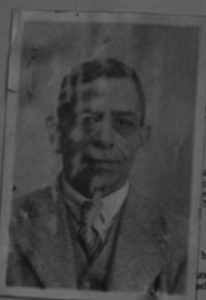
J E H Gatt in 1937. https://www.archivesportaleurope.net/ead-display/-/ead/pl/aicode/MT-NAM/type/fa/id/Passport+Applications+1921-1938/unitid/MFA01+-+18156/search/0/Gatt+Joseph+Edward+Henry
Find out about our connection with Dr Page and an introduction to his diary here
23rd June 1919 Monday
Fire Drill
All material produced or reproduced here and throughout this work is the sole copyright of the author and the family of Doctor D.C.M. Page MC
“At this time the heat was very great, and we all went about without tunics. More of our men left for home on the 23rd, and we had a fire alarm practice that night with good results. All patients were got out of the Hospital within 3 minutes.”
Find out about our connection with Dr Page and an introduction to his diary here
21st June 1919 Saturday
Midsummer’s Day in the UK and a Boat Trip!
All material produced or reproduced here and throughout this work is the sole copyright of the author and the family of Doctor D.C.M. Page MC
“On the evening of Saturday, June 21st, I went for a sail on one of the small river Hospital boats, the ‘Sanitary’. We went up the river Dwina to Kegestroff Island, which lies opposite to Archangel. On this island is a scurvy hospital established by the British Medical Corps. When we came to Archangel first the prisons and hospitals were crowded with cases of scurvy. These were transferred eventually to Kegestroff Island; and the disease stamped out.”
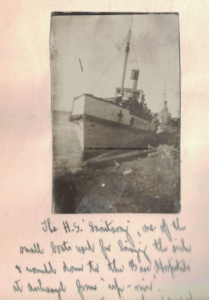
H.S. Sanitary, one of the small boats used for bringing the sick & wounded down to the Base Hospital at Archangel from up-river.
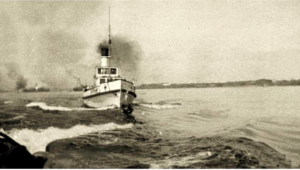
Thanks to Dmitry Bychikhin for supplying this image and annotating the map below.
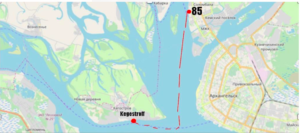
(c) OpenStreetMap contributors
Find out about our connection with Dr Page and an introduction to his diary here
16th June 1919 Monday
Douglas’s Turn To Be The Girl and Goodbye to Colonel Richmond
All material produced or reproduced here and throughout this work is the sole copyright of the author and the family of Doctor D.C.M. Page MC
“On June 16th my Pierrot Troupe gave another concert in the Y.M.C.A. hall at night. We had a packed house again, and in the audience were the D.D.M.S., A.D.M.S., and many other officers. All our sisters were present too. The show was a great success. My turn as a girl with Staff-Sgt. Freeman was the hit of the evening, and we had to repeat the performance. The D.D.M.S. and Col. Richmond made speeches at the end. It was a farewell concert to Col. Richmond and some of our men who left next day on board the ‘Pretoria’ for home and beauty.”
The popular Colonel Richmond who arrived as Major Richmond and was Officer Commanding at the 85thGeneral Hospital was given this grand farewell. Douglas Page marked his war both in France and Russia as an enthusiastic entertainer and was instrumental in putting these concerts together.
Find out about our connection with Dr Page and an introduction to his diary here
14th June 1919 Saturday
Boogie Night! and Beer for The Pianist
All material produced or reproduced here and throughout this work is the sole copyright of the author and the family of Doctor D.C.M. Page MC
“On the evening of Saturday June 14thwe ran a big Hospital Dance in the large dance hall in Solombola. It was a great success. Over 200 persons attended, including many British naval and military officers. Of course, all our Tommies brought their pet ‘Barishnas’ and all our sisters were present. One of our sergeants brought the local star dancer with him, and she gave a very good solo exhibition dance. Lt Stratton of the Camerons, appeared in his kilt, and created a great sensation. He danced the Highland Fling which was loudly applauded. I played the piano all night, and with two of my orderlies as violinists, we made quite a useful orchestra. It was hard work though, and my fingers ached towards 2 o’clock a.m. The refreshments, consisting of ices, coffee, cakes, lemonade etc. were very good. The M.C. (Sgt. Freeman) was a good fellow, and provided some nice cool Bass for me. It was appreciated.”
Lieutenant Stratton of the Gordon Highlanders must have provided an interesting sight in his kilt to the young барышня “Barishnas” (young ladies) of Archangel. The dance was indeed remembered as a great success and attracted newspaper reports. One was included in the diary.
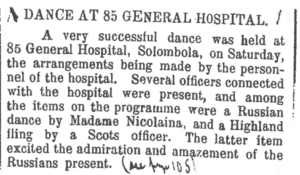
Find out about our connection with Dr Page and an introduction to his diary here
11th June 1919 Wednesday
A Sad Farewell to Douglas’s Compatriots
All material produced or reproduced here and throughout this work is the sole copyright of the author and the family of Doctor D.C.M. Page MC
“Next day the 2/10th Royal Scots sailed on the ‘Czaritsa’ for Blighty. I went into Archangel to see them all before they left, and felt very down-hearted at being left behind.”
For the second-rate men sent out to Russia to do a job, the 2/10 Royal Scots had excelled. They were men who were nominally “not fit for combat”. Under height, underweight, bespectacled and generally men who would have been employed in less physical work, they had fought, and worked their way through the most difficult conditions. They had endured thick forest, the most severe cold and now uncomfortable heat and voracious mosquitos. They had faced a committed enemy and emerged with great valour. Now they deserved their relief and for those that survived the conflict a boat home to Blighty and Bonnie Scotland. Douglas was understandably miffed that he was still needed so far from home.![]()
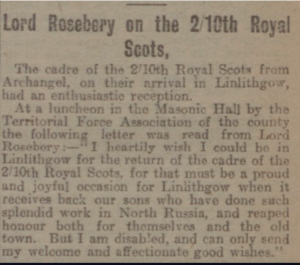
Dundee Evening Telegraph. 23 June 1919 © D.C.Thomson & Co. Ltd. Image created courtesy of THE BRITISH LIBRARY BOARD. https://www.britishnewspaperarchive.co.uk/viewer/bl/0000563/19190623/047/0005
Find out about our connection with Dr Page and an introduction to his diary here
10th June 1919 Tuesday
Guard of Honour, Dyer’s Battalion and Bread and Salt.
All material produced or reproduced here and throughout this work is the sole copyright of the author and the family of Doctor D.C.M. Page MC
“On June 10th I went into Archangel in the afternoon to be an interested spectator of the parade of the newly-arrived British troops. Great crowds lined the street, and round about the Triumphal Arch a dense throng had congregated. I took up a good position near the Arch. The streets were lined by Civil Guards, Russian soldiers and sailors, and Boy Scouts and Girl Guides. The Guard of Honour on the quay was composed of Duyer’s Battalion – composed entirely of captured Bolsheviks trained by Capt. Duyer. The new Brigadier-General arrived at the quay where he was met by General Ironsides with his Staff, and the Russian Governor and his Staff. They inspected the Guard of Honour, and then proceeded to the Arch where the Archangel Town Council was assembled in all its glory. An address of welcome was read out by the Lord Provost, and bread and salt offered as a sign of no ill feeling. Then with bands playing and colours flying the new troops, 46th and 47th Battalion Royal Fusiliers, my old regiment, marched past. It was a stirring sight! The Russians cheered loudly which was a good sign.”
As gratifying as it was to the British to get such a warm welcome, to the Americans it seemed like an ungrateful slight. They took no part in the celebration and contemporary accounts recalled the feeling of annoyance at the perceived lack of thanks from the native population. The Americans felt that the British were getting the accolades for the work being done by their troops.
This is the first mention of Dyer’s Battalion. It was formed from former captured red troops and trained by Captain Dyer.
Captain Royce Coleman Dyer was a Canadian officer whose job was to form and command a Disciplinary Battalion. As the Bolsheviks progressed their advance they released many prisoners held in local jails. These men were then something of a problem to Ironside’s administration in Archangel.
Dyer was given the job of trying to sift through them by interrogation, dividing them into three categories. As Ironside himself put it, “The bads, the less bads, and the probably harmless”. About three hundred in number, the thinking was to try and mould them into a useful force as opposed to locking them up and needing to look after them. Many of them impressed by working as stevedores to help load the British ships with timber that adorned the docks waiting shipment back to the UK. Much to the surprise of the authorities those men seemed to be shaping up to a much needed helpful addition to the allied forces.
Dyer was born 1st February 1889 in Sutton, Quebec and had signed up aged 25 on 23rd September 1914 as an infantry private to the 8th Battalion Canadian Infantry. A veteran of the Western Front and wounded three times, each time he returned to action. Posted in 1918 to Russia and promoted to Sergeant he displayed great valour during an operation to Onega under the command of Colonel Thornhill (previously Indian Army). Promoted in the field to the rank of captain by General Ironside he was decorated with the Military Medal and Bar as well as the Distinguished Conduct Medal. Honoured with the Russian Cross of St. George (4th class) he succumbed to pneumonia and died on the 30th December 1918 at the age of 28. So revered was he by his battalion the 1st Slavo-British, that after his death the battalion carried his photograph at the head of any action and the group continued to be known as Dyer’s Battalion.
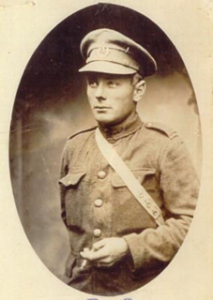
Captain Royce Coleman Dyer https://www.veterans.gc.ca/eng/remembrance/memorials/canadian-virtual-war-memorial/detail/471670
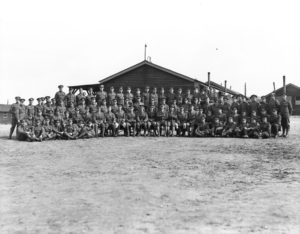
Dyer’s Battalion http://www.bac-lac.gc.ca/eng/CollectionSearch/Pages/record.aspx?app=FonAndCol&IdNumber=3405032
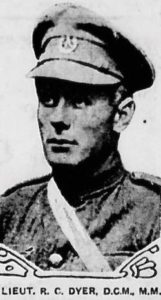
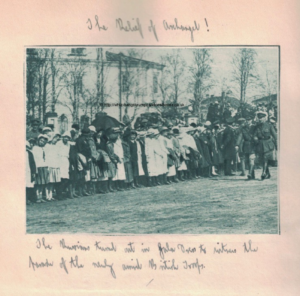
The Russians turned out in Gala Dress to witness the parade of the newly arrived British troops.
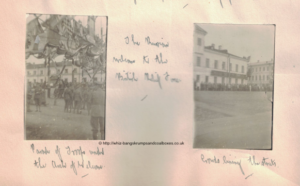
The Russian Welcome to the British Relief Force
Parade of troops under the Arch of Welcome. Crowds lining the streets
Find out about our connection with Dr Page and an introduction to his diary here
9th June 1919 Monday
A Sleepless Night and a Swollen Lip
All material produced or reproduced here and throughout this work is the sole copyright of the author and the family of Doctor D.C.M. Page MC
“I spent a sleepless night and next day when I got up found that my right eye was completely bunged up, and my lower lip was like that of a nigger! The mosquitoes were very troublesome all summer, and we had to put mosquito nets over our beds at night. We also made nets to fit over all the beds in hospital.”
Apologies to anyone offended by Douglas’s terminology but, that was how things were in 1919 and for many years to come.
Find out about our connection with Dr Page and an introduction to his diary here
8th June 1919 Sunday
Prasnik Day With a Sting!
All material produced or reproduced here and throughout this work is the sole copyright of the author and the family of Doctor D.C.M. Page MC
“Sunday, June 8th, was a big ‘Prasneek Day’ (holiday), and all the houses were decorated, inside and out, with branches of trees. Even the shipping on the river was decorated – branches of trees were stuck on the masts and funnels of boats. Our Russian sisters had decorated the wards. I had a walk along the riverside with some of the other officers, and was horribly stung by mosquitoes. Luckily they do not carry malaria, but the bites proved to be very troublesome.”
Our Archangel correspondent Dmitry Bychiknin has contributed that the holiday or Prasnik was that of Pentecost.
Find out about our connection with Dr Page and an introduction to his diary here